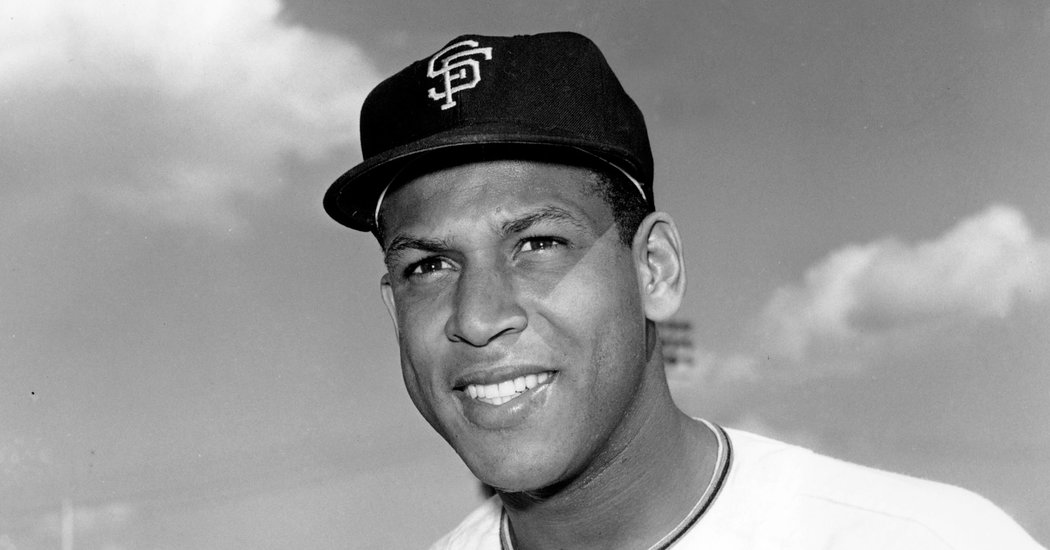Breaking News
Orlando Cepeda, Baseball Star Known as the Baby Bull, Dies at 86

Orlando Cepeda, the second Puerto Rican-born player to be inducted into the Baseball Hall of Fame and one of the leading sluggers of his time, from the late 1950s to the early ’70s, passed away on Friday at the age of 86.
His death was confirmed by the San Francisco Giants. The organization did not disclose the location of his passing.
During his 17 seasons in the major leagues, predominantly at first base but also in the outfield and as a designated hitter towards the end of his career, Cepeda hit 379 home runs, amassed 2,351 hits, drove in 1,365 runs, and concluded his career with a batting average of .297.
He was named the National League’s rookie of the year with the Giants in 1958 and was also selected as the league’s most valuable player in 1967, the year he helped the St. Louis Cardinals secure a World Series championship. Cepeda had nine seasons where he hit at least .300 and participated in nine All-Star Games.
Cepeda’s father, Pedro, known as the Bull for his strength, was a professional baseball player, primarily a shortstop, who was often referred to as the Babe Ruth of Puerto Rico. Orlando Cepeda, a muscular 6-foot-2, 210-pound right-handed power hitter, earned the moniker the Baby Bull.
While playing in the Giants’ farm system, Juan Marichal, the future Hall of Famer from the Dominican Republic, drew inspiration from Cepeda and his fellow Latino players on the Giants.
“I would see Orlando Cepeda, Felipe Alou, and Ruben Gomez on television,” Marichal once shared with The Associated Press. “I started learning what the major leagues were all about, and I hoped that one day I could be one of them.”
Marichal described Cepeda as a fearless player and someone you wanted on your team.
However, Cepeda’s reputation took a hit a year after his retirement.
In December 1975, he was arrested in San Juan for his involvement in smuggling marijuana from Colombia and served 10 months in federal prison.
The Baseball Writers Association of America, possibly considering his prison term, rejected Cepeda for the Hall of Fame in 15 years of voting. It wasn’t until 1999, with a vote by the Veterans Committee, that Cepeda was enshrined in Cooperstown.
In Puerto Rico, Cepeda was almost as revered as Roberto Clemente, the first Hall of Famer from the commonwealth. However, Cepeda’s drug conviction contrasted with Clemente’s altruism and led to his alienation at home post his prison release.
Reflecting on his past, Cepeda told Sports Illustrated before his Hall of Fame induction, “When you play baseball, you have a name and money and you feel like you’re bulletproof. You forget who you are. Especially in a Latin country, they make you feel like you are God. I learned that one mistake, in two seconds, can make a disaster that seems to last forever.”
Orlando Cepeda was born in Ponce, P.R., on September 17, 1937. His father, though a baseball hero in Puerto Rico and the Caribbean, fell victim to the major leagues’ color barrier. He passed away in 1955, just before his son began his career in the Giants’ farm system.
Cepeda claimed the rookie of the year title after hitting .312 with 25 home runs for the 1958 Giants. Three years later, he led the league in home runs with 46 and runs batted in with 142, alongside a lineup that included Willie Mays, Willie McCovey, and Felipe Alou.
Cepeda played a pivotal role in propelling the Giants to their first pennant in San Francisco in 1962, although they were defeated by the Yankees in the World Series.
Dealing with knee injuries, Cepeda was traded to the Cardinals early in the 1966 season for pitcher Ray Sadecki. The following year, he achieved a career-high batting average of .325 and led the National League in runs batted in, with 111, earning him M.V.P. honors. The Cardinals went on to triumph over the Boston Red Sox in the World Series.
Cepeda contributed to the Cardinals’ pennant-winning team in 1968 and later played for the Atlanta Braves, Oakland Athletics, and Red Sox. He retired in 1974 after a single season with the Kansas City Royals.
After relocating to Southern California in the mid-1980s, he embraced Buddhism while aiming for a comeback in the baseball realm. “From the moment I stepped into the temple, it changed my life,” he told The A.P. in 1993. “It taught me to accept responsibility for my actions, not to blame others.”
Cepeda returned to the San Francisco area in 1987. He scouted for the Giants in 1988 and then joined their community relations department, speaking to youths over the years about substance abuse.
However, trouble arose in May 2007 when Cepeda was pulled over for speeding in Solano County, north of San Francisco. The police discovered cocaine, marijuana, and hypodermic syringes in his car. He pled no contest to possessing less than one ounce of marijuana and was fined $100.
The county district attorney, David Paulson, dismissed the prosecutor overseeing the case just before the prosecutor was set to resign, suggesting that dropping the felony cocaine charges indicated preferential treatment due to Cepeda’s celebrity status.
At the time of his passing, Cepeda held the title of community ambassador in the Giants organization. Information on survivors was not immediately available.
Despite being shunned in Puerto Rico for many years, Cepeda found redemption upon his Hall of Fame election. The Puerto Rican government organized a parade in his honor, starting at the San Juan airport where he was arrested 24 years earlier, and winding through Old San Juan lined with spectators.
The Giants retired Cepeda’s No. 30 two weeks prior to his Hall of Fame induction. In September 2008, they unveiled a bronze statue in his honor outside their stadium, AT&T Park (now Oracle Park), alongside statues commemorating Mays, McCovey, Marichal, and Perry.
After enduring numerous challenges, Cepeda expressed deep gratitude, stating during the statue unveiling to The San Francisco Chronicle, “When things like this happen to you, that’s when I say to myself, ‘Orlando, you’re a very lucky person.’”
-

 Destination8 months ago
Destination8 months agoSingapore Airlines CEO set to join board of Air India, BA News, BA
-

 Breaking News10 months ago
Breaking News10 months agoCroatia to reintroduce compulsory military draft as regional tensions soar
-

 Gadgets3 months ago
Gadgets3 months agoSupernatural Season 16 Revival News, Cast, Plot and Release Date
-

 Tech News12 months ago
Tech News12 months agoBangladeshi police agents accused of selling citizens’ personal information on Telegram
-

 Productivity11 months ago
Productivity11 months agoHow Your Contact Center Can Become A Customer Engagement Center
-

 Gadgets4 weeks ago
Gadgets4 weeks agoFallout Season 2 Potential Release Date, Cast, Plot and News
-

 Breaking News10 months ago
Breaking News10 months agoBangladesh crisis: Refaat Ahmed sworn in as Bangladesh’s new chief justice
-

 Toys12 months ago
Toys12 months ago15 of the Best Trike & Tricycles Mums Recommend























